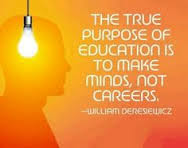One thing I’ve learned in my lifetime is that you just never know when something you learn will come in handy.
First, let us be clear that the term ‘liberal arts’ has nothing to do with being a liberal or conservative. Now, keep reading…
I was reminded of this today after reading an article last week. The article from The Washington Post touted the importance of a liberal arts education, Why STEM Won’t Make Us Successful. My favorite quote included was from Steve Jobs, “it’s in Apple’s DNA that technology alone is not enough — that it’s technology married with liberal arts, married with the humanities, that yields us the result that makes our hearts sing.” http://www.washingtonpost.com/opinions/why-stem-wont-make-us-successful/2015/03/26/5f4604f2-d2a5-11e4-ab77-9646eea6a4c7_story.html
That makes my heart sing.
Why? Two reasons…
1. Were it not for my liberal arts education I would not be nearly as equipped to help Tucker become all that he is meant to become.
2. There is not a more important piece of Tucker’s education than a full liberal arts focus.
Allow me to focus…
The point of a liberal arts education was based in the idea of creating a citizenry that has the skills for leading ideals that support freedom. Literally – the term liberal arts comes from the Latin ‘rates liberales’ which means the subjects that free persons should study. The verb ‘to educate’ in Latin means ‘to lead.’ Therefore…the main purpose of a liberal arts education is to lead in a free world.
The areas that are most often supported in a liberal arts education come from the idea that humans should learn from a holistic approach – not simply academics but also to support areas of emotional, social, ethical, and personal growth.
Still interested? Read Humanity, Diversity, and The Liberal Arts: The Foundation of a College Education by Joe Cuseo and Aaron Thompson.
Was that nerdy enough for you?
Perfect – it’s the point of a liberal arts education.
Over the past couple of days I have made posts that have made my interest in research and learning incredibly obvious. Today, I received a message from a person in England that was impressed by, ‘all of the research you have done.’
Correct. I have initiated and completed quite a bit of research. How did I learn that? From my liberal arts education.
From the courses that I took that required me to read and to read deeply, to look beyond words – to do and understand rhetorical analysis.
From the courses I took that required me to understand statistics and how they are used to validate new ideas and concepts.
From the courses I took that gave me a broad understanding of educational theory.
From the courses I took that taught me about schools of thinking…yes – Plato, Socrates, Aristotle, Sophocles
From the courses I took that encouraged me to understand and develop an appreciation for different people and cultures.
Not just from my courses though. From my full liberal arts experience…
From being on a debate team and learning how to REALLY research
From being involved in theatrical performances where I learned how to really emulate and understand the feelings and experiences of the other.
From directing performance and understanding different modalities of motivation.
From having Professor’s who challenged me to think beyond what I saw, heard, or read.
All of the ways that I am able to help Tucker came through a strong liberal arts education. I needed that background to be able to teach him, advocate for him, and understand him.
Why is all of this important to Tucker?
He gets science, technology, engineering, and mathematics (STEM). Those areas are his natural tendencies.
He NEEDS a liberal arts education to be a more balanced human and develop skills that will allow him to lead in this free world. Please don’t take away his opportunity to use his naturally occurring STEM skills in a humanistic world.
If the current rate of autism diagnosis is 1 in 68 children – that in itself is an argument to treasure our liberal arts programs. Currently 11, 928 student attend the university where I teach. While oversimplified – this would mean that approximately 175 students on our campus would experience a spectrum-world.
It is a bold statement…but I would argue that these students (from my own personal experience) need the emotional, social, ethical, and personal growth supports that a liberal arts education provides. It’s not a ‘bonus or benefit’ for them, it is a need.
Policymakers – if you are listening here, please pay attention. My Tucker needs to be taught by teachers who experienced a liberal arts background. He needs people to present him with varying humanistic viewpoints.
He is the epitome of what Jobs describes – his DNA is in the technology – but his heart needs to be carefully cared for.
Why? So that he can create and develop STEM ideas that make a difference in our free society. Without knowing and understanding the human condition…how can he use his skills to advance our free society?

And ALL students, spectrum or not, would benefit greatly from educators remembering this. Pete’s biggest complaint about high school (and to a certain degree college) was that “they don’t teach people to think!” Thus, the need for your graphic about minds at the end of this post.
LikeLike
I could not agree more! All focusing on one academic area or another does is further drive wedges between our ‘areas of giftedness.’ Our society will thrive and more strongly survive when we jump across those invisible boundaries and learn to respect different viewpoints and work together.
LikeLike
Pingback: Day #327 – Indexing | 366 Days of Autism